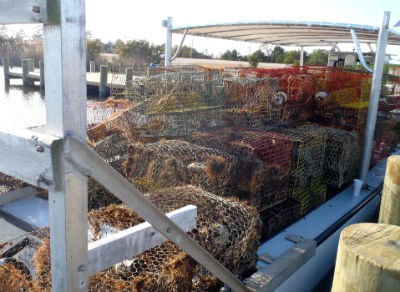
COASTAL NORTH CAROLINA — The sixth year of the North Carolina Coastal Federation Lost Fishing Gear Recovery Project is set to kick off this week.
Seventy-eight commercial watermen are expected to work along the coast starting around Thursday to collect lost crab pots in the state’s sounds, the federation announced Monday in a press release.
Supporter Spotlight
These cleanup efforts are timed with the annual closure set for Jan. 15 to Feb. 7 of internal coastal waters to all crab, eel, fish and shrimp pots, commonly called the “no-potting” period.
The federation is working with North Carolina Marine Patrol for the project funded with $100,000 from the North Carolina General Assembly. The project received grants the first year of the effort in 2014 from North Carolina Sea Grant and the National Oceanic and Atmospheric Administration Marine Debris Program, when the cleanup only took place in the state’s northeastern waters.
The project expanded statewide in January 2017 to all internal coastal waters using continued funding from the General Assembly. During the 2018 project, more than 2 million acres of waterways were canvassed to recover a total of 3,496 crab pots by 76 watermen along the coast. The pots, which can become lost in a variety of ways, pose a hazard to boaters and wildlife.
“I’ve seen great success in the partnerships involved with this cleanup work over the past several years,” said Chad Hemilright, project participant from Kitty Hawk. “Being on the water nearly every day as a full-time commercial fisherman, it’s important to remove the lost pots and keep our waters clean and safe.”
This year, the federation received more than 60 applications and 39 crews have been selected to assist with the on-water cleanup. With the combied efforts of the commercial license holders and marine patrol officers, this project aims to improve fish habitat and water quality and supports the coastal economy. Once the pots are collected, they are recycled to the best extent possible.
Supporter Spotlight
Sara Hallas, coastal education coordinator for the federation and project leader, said she’s excited to cleanup the waterways and create opportunities for work during this time of the year.
“We’re thankful to the General Assembly for their continued support, which is vital to the success of the project,” Hallas said. “This project also wouldn’t be possible without the support of community organizations and our commercial watermen and women, who have consistently expressed that helping with this project and protecting waterways is important to them.”
The federation kicked off this campaign Jan. 12 with different volunteer cleanup events at locations along the coast. The Wanchese office focused its efforts near the public boat ramp in Rodanthe in partnership with Dare County. The central and headquarters office hosted a volunteer cleanup at Hoop Pole Creek Natural Trail in Atlantic Beach. The federation’s Wrightsville Beach office partnered with the North Carolina Coastal Reserve and Keep Onslow Beautiful to cleanup Morris Landing Clean Water Preserve.
“Our community really took a hit this year due to Florence and we’re expecting higher numbers of pots,” said Bree Charron, coastal specialist at the Ocean office. “The watermen and women are eager to do their part to further the ongoing recovery process by getting these derelict pots out of the water. They’re extremely grateful for the opportunity to earn some money during the slow season while being stewards of the waters they depend on.”
Ted Wilgis, coastal education coordinator at the Wrightsville Beach office, in a statement, said, “The watermen and women really look forward to this opportunity, not only for the additional income during a slow period, but also for the chance to demonstrate their stewardship of our coastal waters. This year the program is especially important due to the losses suffered by fishers and their communities due to the hurricanes as well as the number of crab pots lost. We greatly appreciate the support of the General Assembly for this vital and effective program.”







